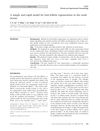 2 citations,
April 2017 in “Molecular Medicine Reports”
2 citations,
April 2017 in “Molecular Medicine Reports” Blocking autophagy increases survival of inner ear hair cells exposed to gentamicin.
October 2024 in “Acta Biomaterialia” Collagen makes skin stiff, and preservation methods greatly increase tissue stiffness.
 1 citations,
January 2017 in “Springer eBooks”
1 citations,
January 2017 in “Springer eBooks” The document explains how hair follicles develop, their structure, and how they grow.
 May 2017 in “Journal of microscopy and ultrastructure”
May 2017 in “Journal of microscopy and ultrastructure” Water quality affects mineral content in hair, and coconut oil can protect against damage.
 11 citations,
February 2019 in “Frontiers in Physiology”
11 citations,
February 2019 in “Frontiers in Physiology” Hair properties are interconnected; a comprehensive, cross-disciplinary approach is essential for understanding hair behavior.
75 citations,
September 2016 in “EMBO journal” PRC2 is essential for maintaining intestinal cell balance and aiding regeneration after damage.
 36 citations,
May 2016 in “Biomaterials”
36 citations,
May 2016 in “Biomaterials” Endo-HSE helps grow hair-like structures from human skin cells in the lab.
 8 citations,
January 2015 in “Clinical and Experimental Dermatology”
8 citations,
January 2015 in “Clinical and Experimental Dermatology” A new model for hair regeneration in mice was created in 2015, which is faster and less invasive than the old method, producing normal hairs in about 21 days.
3 citations,
July 2023 in “Frontiers in Aging” Hair follicle stem cells change states with age, affecting hair growth and aging.
 2 citations,
July 2007 in “Cancer biology & therapy”
2 citations,
July 2007 in “Cancer biology & therapy” Bexxar is highly effective as a first treatment for non-Hodgkin's lymphoma, with most patients alive and many in remission after eight years.
 4 citations,
September 2023 in “Stem cell research & therapy”
4 citations,
September 2023 in “Stem cell research & therapy” Special particles from umbilical cord stem cells help heal skin wounds in diabetic mice by preventing certain immune cell death.
 1 citations,
January 2024 in “Advanced science”
1 citations,
January 2024 in “Advanced science” Fibronectin-attached cell sheets improve wound healing and are safe and effective.
 2 citations,
February 2024 in “Nature cell biology”
2 citations,
February 2024 in “Nature cell biology” Mechanical forces are crucial for shaping cells and forming tissues during development.
 26 citations,
December 2021 in “Regenerative Biomaterials”
26 citations,
December 2021 in “Regenerative Biomaterials” The hydrogel speeds up skin wound healing and helps regenerate tissue.
 1 citations,
December 2022 in “The journal of investigative dermatology/Journal of investigative dermatology”
1 citations,
December 2022 in “The journal of investigative dermatology/Journal of investigative dermatology” Choosing the right method to separate skin layers is key for good skin cell research.
 December 2023 in “bioRxiv (Cold Spring Harbor Laboratory)”
December 2023 in “bioRxiv (Cold Spring Harbor Laboratory)” Aged individuals heal wounds less effectively due to specific immune cell issues.
128 citations,
August 2020 in “Cell stem cell” Dermal fibroblasts have adjustable roles in wound healing, with specific cells promoting regeneration or scar formation.

Forensic hair analysis for drugs is now more reliable and accurate.
 March 2024 in “Advanced science”
March 2024 in “Advanced science” A new hydrogel made from human cells improves wound healing by working with immune cells to promote repair.
 1 citations,
July 2020 in “Dermatology”
1 citations,
July 2020 in “Dermatology” Photobiomodulation helps reduce pain, lessen inflammation, heal wounds, and can be used in skin treatments. It also boosts hair growth in women with hair loss and may help fight microbes and prevent respiratory issues in COVID-19.
 47 citations,
July 2014 in “European Journal of Pharmaceutics and Biopharmaceutics”
47 citations,
July 2014 in “European Journal of Pharmaceutics and Biopharmaceutics” Scientists created a gel with nanoparticles to deliver medicine to hair follicles effectively.
1 citations,
January 2022 in “Journal of Drug Delivery Science and Technology” The optimized microemulsion with cinnamon oil effectively delivers finasteride through the skin without damaging hair.
 181 citations,
January 2009 in “Nature Genetics”
181 citations,
January 2009 in “Nature Genetics” Certain mutations in a hair growth-related gene cause a type of genetic hair loss.
 10 citations,
January 2012 in “Journal of biomedical optics”
10 citations,
January 2012 in “Journal of biomedical optics” Melanin density affects hair color, and this method can help in cosmetic assessments and diagnosing hair diseases.
 1 citations,
July 2005 in “Informa Healthcare eBooks”
1 citations,
July 2005 in “Informa Healthcare eBooks” Hair follicles could be used for targeted drug delivery, with liposomal systems showing promise for this method.
 39 citations,
January 2015 in “Journal of Electroanalytical Chemistry”
39 citations,
January 2015 in “Journal of Electroanalytical Chemistry” New sensor detects minoxidil accurately and effectively.
 40 citations,
January 2013 in “Journal of Korean Medical Science”
40 citations,
January 2013 in “Journal of Korean Medical Science” Iron deficiency may contribute to hair loss.
11 citations,
August 2021 in “Aging” Collagen and TGF-β2 help maintain hair cell shape and youthfulness.
 134 citations,
December 2018 in “Dermatology and Therapy”
134 citations,
December 2018 in “Dermatology and Therapy” Some vitamins and minerals like vitamin D and iron can help with certain types of hair loss, but more research is needed for others.
27 citations,
July 2013 in “The journal of investigative dermatology/Journal of investigative dermatology” Lasers have become precise tools in skin treatment and diagnosis, with ongoing advancements improving their effectiveness.























